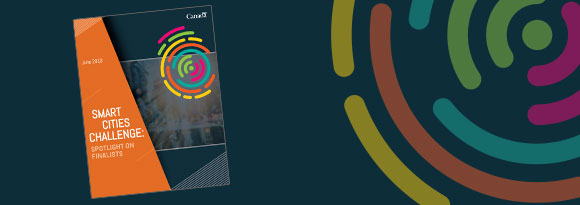City of Saskatoon, Saskatchewan
This page has been archived on the Web
Information identified as archived is provided for reference, research or recordkeeping purposes. It is not subject to the Government of Canada Web Standards and has not been altered or updated since it was archived.
The first round of the Smart Cities Challenge is closed. The Government of Canada announced the four winners (City of Montréal, Québec; Nunavut Communities, Nunavut; City of Guelph and County of Wellington, Ontario; and Town of Bridgewater, Nova Scotia) on May 14, 2019.

Executive Summary
- PDF Version (177.49 KB)
- HTML Version
"Saskatoon is set to become a smart city, a place where Indigenous youth lead lives with purpose, identity, belonging and security, overcoming major obstacles."
– finalist video
"Our challenge statement is to be the city that breaks the cycle of Indigenous youth incarceration by creating a new cycle focused on building purpose, belonging, security, and identity"
– final proposal
Challenge Statement
To be the city that breaks the cycle of Indigenous youth incarceration by creating a new cycle focused on building purpose, belonging, security and identity.
Summary
Saskatoon has a bold vision to be a city that supports all individuals to feel a sense of purpose, belonging, security and identity. People are being left behind, many of them are youth, and many of them are urban Indigenous youth. Urban Indigenous youth face multiple challenges that are rooted in intergenerational trauma, racism, and a disrupted relationship with cultural and spiritual traditions. This is manifesting itself in an escalating cycle of crime that results in Saskatoon having a youth incarceration rate that is double the national average.
This cycle of crime and social exclusion is resulting in millions of dollars being spent to warehouse people in facilities where instead of rehabilitating they become hardened and in many cases involved in increasingly serious crime. This cycle continues through generations. The existing system is failing all of us.
The City of Saskatoon has initiated a partnership with key institutions all committed to working together in finding proactive, preventative solutions to youth incarceration. Our Smart Cities Challenge will build on this collaborative work and use innovative technology to strengthen and connect the supports for youth to grow in a positive learning cycle rather than find themselves pulled into a cycle of crime.

Spotlight on Finalists:
City of Saskatoon, Saskatchewan
Population: 246,376
Focus Areas:


Prize Category:

#smartcitiesCanada
The Jury's Perspective
Read the transcript
My name is Leanne Bellegarde. I'm from the Peepeekisis First Nation, in the File Hills Qu'Appelle Tribal Council of Saskatchewan. It's in Treaty 4 Territory. I'm the director of strategic inclusion for Nutrien. My home is Saskatoon, Saskatchewan.
The opportunity to be a jury member for "Smart Cities Challenge" is really about inspiring the future of this country and challenging Canada to be that all it can be through empowering people and communities to do what they know and do best, serve their people with a view to the future.
Being indigenous and young in Canada shouldn't be a crime, and, in fact, it isn't. But too often, this is a demographic in our country that faces issues that seem insurmountable, be they poverty, race, mental health, addictions, or other social issues. And there is an opportunity through Saskatoon's proposal to address this much more holistically than we've seen in the past.
For the fastest, youngest growing demographic in this country, Saskatoon's proposal offers us a chance to see a holistic wraparound approach to addressing all of the related issues, both to head off the potential for the criminalization of indigenous youth, but also to divert and restore the balance for indigenous youth who has been impacted by these issues adversely and directed to the justice system. Saskatoon's proposal is inspiring because of the multi-partnerships that it brings together at the willingness to recognize that we no longer need to police these problems and that there are more effective ways to challenge, and save, and nurture our youth for the generations to come.
The Finalist's Perspective
Read the transcript
The smart cities challenge is a competition that called in Canadian communities to explore how data and connected technology can achieve meaningful outcomes for residence.
On screen:
Smart Cities Challenge
Winning communities
School
The finalists
$10M category: City of Saskatoon, Saskatchewan
Tell us about your team and your community
Stephanie Yong (Project lead, smart cities challenge): so on our team, we have a number of people who are helping to drive this challenge statement. So, as myself, I'm the project lead for the City of Saskatoon smart cities challenge. We have Michelle Beveridge, whose part of the mayor's office. We have Jas Pabla who's the IT lead, Linda Cray, who's a director of a community and recreation services and then Shannon Hanson, who is a diversity coordinator. In addition, we also have some advisors who are on our core team and that includes two indigenous youth advisors, as well as Mike Tenton who's in indigenous creman, who has worked with youth and Cliff Tupwisin who is the executive director of Saskatoon Tribal council.
On screen: Why did you enter the challenge?
Michelle Beveridge (Chief of staff, Mayor's office, City of Saskatoon): city council has made community safety and well-being a priority for them and when the smart cities challenge opportunity came up, they said we would be very interested in you finding something that would fit in this particular priority, it's an area that has been coming up in the community over and over again and our crime rate is very high, we're doubled in national average of youth who are in jail, we have an exceptional amount of resources that are going into youth in jail, and people feel unsafe. So, this was an area that wanted to look at and the more we were doing community consultations, the more we were able to narrow down to it being indigenous youth incarceration, how we can break that cycle would actually make our community safer and it would provide well-being for everyone in our community.
On screen: Challenge statement: To be the city that breaks the cycle of Indigenous youth incarceration by creating a new cycle focused on building purpose, belonging, security and identity.
Join the conversation: #smartcitiesChallenge
Infrastructure Canada
- Date modified: